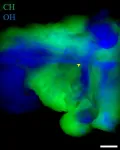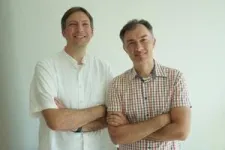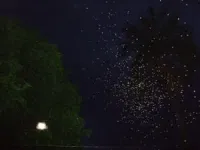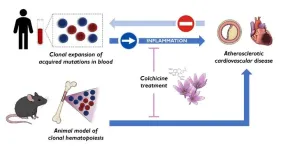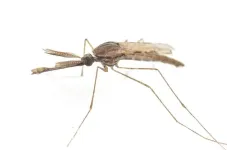(Press-News.org) The imaging techniques currently used in biological research cannot penetrate into deeper tissue layers. In cancer treatment, this means that remnants of tumors or individual cancer cells at tumor margins and in lymph nodes are not visible. Doctors performing surgery are therefore repeatedly faced with the difficult question of whether all of the affected tissue has actually been removed. For the patient's quality of life, however, the complete removal of the tumor is just as essential as the preservation of healthy tissue and organs.
In their research, the scientists led by Oliver Bruns, Andriy Chmyrov, Ellen Sletten and Christopher Rowlands are making use of the properties of short-wave infrared light. Thanks to its lower scattering, it can penetrate deeper into tissue, enabling improved visualization of tissue structures.
“In cancer research in particular, the unprecedented sensitivity of imaging using short-wave infrared light, fluorescent dyes and state-of-the-art cameras may enable us to make even just a few cancer cells clearly visible,” explains Prof. Oliver Bruns. "Our goal is to precisely detect and remove even the smallest tumor remnants in the future.
The Chan Zuckerberg Initiative has recognized the potential of this technology and has already funded the researchers with one million USD in 2021. Based on the outstanding results in the first funding phase, the team will now even receive funding of USD 2.2 million. The consortium led by Oliver Bruns and Andriy Chmyrov from the Department of Functional Imaging in Surgical Oncology at the National Center for Tumor Diseases Dresden (NCT/UCC) is one of the nine selected beneficiaries from around 300 funding applications submitted.
Oliver Bruns holds a Chair in the Faculty of Medicine at TU Dresden funded by the German Cancer Research Center (DKFZ). In addition to the Faculty of Medicine, Carl Gustav Carus University Hospital Dresden and the Helmholtz-Zentrum Dresden-Rossendorf, the DKFZ is one of the bodies responsible for the National Center for Tumor Diseases Dresden (NCT/UCC Dresden), which is one of the six NCT sites in Germany.
The research team intends to use the funding to carry out fundamental studies and utilize novel physical effects in order to identify the optimal conditions for short-wave infrared imaging. To this end, they are working on the design of special Raman probes and a visionary microscope that will overcome the limitations of previous microscopy techniques. These highly innovative technologies could be used in various areas of biological research and medical diagnostics and, for the first time, enable the non-invasive microscopic examination of deeper tissue layers.
Prof. Esther Troost, Dean of the Carl Gustav Carus Faculty of Medicine, emphasizes: “The funding from the Chan Zuckerberg Initiative underlines the outstanding quality of research at our faculty. The work of the team led by Oliver Bruns and Andriy Chmyrov is helping to set new benchmarks in medical imaging and significantly improve the diagnosis of tumor diseases." For the Director of the Clinic and Polyclinic for Radiotherapy and Radiation Oncology at University Hospital Dresden, this opens up the prospect of being able to better calculate the target volume of radiation, just to give one example. ”So far, the basis for this radiation has been conventional imaging techniques such as MRI. We were not able to detect tumor spread in this way. This scientific approach is therefore an essential step towards improved therapy."
Prof. Jürgen Weitz, Managing Director of the NCT/UCC and Director of the Clinic for Visceral, Thoracic and Vascular Surgery, agrees that these scientific efforts provide the opportunity for more precise operations: “With this technology, we can locate and remove tumors more precisely, which could significantly increase the success rate of surgical interventions.”
Prof. Michael Albrecht, Medical Director of the University Hospital of Dresden, adds: “This advanced imaging technology has the potential to significantly improve patient care by enabling more precise diagnoses and more individualized treatment approaches.”
More information on Prof. Oliver Bruns' research: Detecting minute cancer cells during surgery
Contact:
National Center for Tumor Diseases Dresden (NCT/UCC)
Fetscherstraße 74/PF 64
01307 Dresden
Tel.: +49 351 458 3371
Email: info@nct-dresden.de
www.nct-dresden.de
Anne-Stephanie Vetter
Staff Unit Public Relations of the Carl Gustav Carus Faculty of Medicine
at TUD Dresden University of Technology
National Center for Tumor Diseases (NCT/UCC) Dresden
Tel.: +49 351 458-17903
Email: anne-stephanie.vetter@tu-dresden.de
www.tu-dresden.de/med
NCT/UCC Dresden
The National Center for Tumor Diseases Dresden (NCT/UCC) is a joint institution of the German Cancer Research Center (DKFZ), the Carl Gustav Carus University Hospital Dresden, the Faculty of Medicine at TUD Dresden University of Technology, and the Helmholtz-Zentrum Dresden-Rossendorf (HZDR).
The NCT has made it its duty to closely link research and patient care wherever possible. It is a long-term cooperation between the German Cancer Research Center (DKFZ), excellent partners in university medical centers (UMCs) and other research institutions at various locations in Germany. The aim of the NCT is to translate innovations in cancer research in Germany into studies in a targeted and rapid manner in order to cure cancer while maintaining a high quality of life. Patients are research partners on an equal footing. The Dresden center draws on the structures of the University Cancer Center Dresden (UCC), which was founded in 2003 as one of the first Comprehensive Cancer Centers (CCC) in Germany. Since 2007, the Dresden Center has been honored by the German Cancer Aid e.V. (DKH) as a "Top Oncological Center" on a continuous basis.
END
NCT/UCC Dresden: Millions in funding from the Chan Zuckerberg Initiative for state-of-the-art imaging to accurately detect minute tumors
2024-08-30
ELSE PRESS RELEASES FROM THIS DATE:
CNIC scientists discover a new cardiovascular risk factor and identify a drug able to reduce its effects
2024-08-30
To the known risk factors for cardiovascular disease—high blood pressure, high cholesterol, diabetes, overweight and obesity, smoking, and physical inactivity—a new one has to be added: clonal hematopoiesis. This condition is triggered by acquired mutations in blood stem cells and was already known to be associated with an elevated cardiovascular risk. However, until now it was uncertain if clonal hematopoiesis was a cause or consequence of cardiovascular disease. Now, a new study published in Nature Medicine and carried out by researchers at the Centro Nacional de Investigaciones Cardiovasculares (CNIC) resolves this critical debate ...
When the heat makes you disoriented
2024-08-30
Climate change is affecting ecosystems in many different ways. One of its consequences are increasingly longer and more intense periods of heat, which affect essential natural processes – such as pollination. A team of researchers from Julius-Maximilians-Universität Würzburg (JMU) has now investigated in more detail how heat affects one particular player in these processes: The bumblebee.
"Bumblebees are important pollinators in natural and agricultural systems. They therefore ...
Showcasing latest AI updates, Insilico Medicine attends 2024 EFMC International Symposium on Medicinal Chemistry
2024-08-30
Attracting around 1,000 participants from industry and academia, the XXVIII EFMC International Symposium on Medicinal Chemistry (EFMC-ISMC) is supposed to take place in Rome, Italy from September 1-5, 2024. After the generative AI updates recently announced on the IMGAIA webinar, Insilico Medicine will be sharing more innovative details while exploring collaboration chances at Booth #50.
EFMC-ISMC is a key symposium in the field of medicinal chemistry and drug discovery, and the symposium this year features ...
Novel chemical tool aims to streamline drug-making process
2024-08-30
COLUMBUS, Ohio – The invention of a tool capable of unlocking previously impossible organic chemical reactions has opened new pathways in the pharmaceutical industry to create effective drugs more quickly.
Traditionally, most drugs are assembled using molecular fragments called alkyl building blocks, organic compounds that have a wide variety of applications. However, because of how difficult it can be to combine different types of these compounds into something new, this method of creation ...
New discoveries about how mosquitoes mate may help the fight against malaria
2024-08-30
Link to Google Drive folder containing images with caption and credit information:
https://drive.google.com/drive/folders/1UM9rl47Xd_Bs-ov0HpVwC-rtUDonM3oJ?usp=sharing
Post-embargo link to release:
https://www.washington.edu/news/2024/08/30/mosquito-swarm/
Embargoed by Current Biology
For public release at 11 a.m. U.S. Eastern Time (8 a.m. U.S. Pacific Time) on Friday, Aug. 30, 2024
A high-pitched buzzing sound in your ear is an unmistakable sign that a female mosquito is out on the hunt — for they, not males, drink blood. Hearing ...
It’s worth challenging that troubling medical bill, study finds
2024-08-30
Many people who receive a problematic medical bill don’t challenge it – but new USC Schaeffer Center research shows they are likely missing out on a chance for financial relief.
About 1 in 5 people said they recently received a medical bill they disagreed with or couldn’t afford, including 61.5% who said they contacted a billing office to address their concern, according to survey results published Aug. 30 in JAMA Health Forum. Most who reached out said they received some form of payment help or had their bill corrected.
It’s ...
New study finds Medicare Advantage (MA) enrollees experience similar declines in frailty over one year compared with Traditional Medicare (TM) enrollees
2024-08-30
Enrollment in Medicare Advantage (MA) plans is not associated with altered frailty trajectories compared with enrollment in Traditional Medicare (TM), according to research published today in JAMA Network Open.
In the article Frailty in Medicare Advantage Beneficiaries and Traditional Medicare Beneficiaries, lead author Sandra M. Shi, MD, MPH and colleagues suggest that more work is needed to better understand the health services needs of older adults with frailty.
“A growing proportion of the population is enrolling in Medicare Advantage (MA), which typically ...
Autoimmune sequelae after Delta or Omicron variant SARS-CoV-2 infection in a highly vaccinated cohort
2024-08-30
About The Study: This cohort study observed no significantly elevated long-term risk of autoimmune sequelae after SARS-CoV-2 Delta and Omicron BA.1 or BA.2 variant infection, except for a modestly increased risk of inflammatory bowel disease and bullous skin disorders in the hospitalized subgroup during the predominance of the Omicron variant. Booster vaccination appeared to mitigate the risk of long-term autoimmune sequelae.
Corresponding Author: To contact the corresponding author, Liang ...
Racial disparities in cancer stage at diagnosis and survival for adolescents and young adults
2024-08-30
About The Study: The findings of this study suggest that racial disparities in cancer stage at diagnosis and survival exist among adolescent and young adult patients when disaggregated according to federal guidelines, which has health policy and funding implications. These results support the need for tailored interventions and informed public policy to achieve cancer care equity for all races.
Corresponding Author: To contact the corresponding author, Kekoa Taparra, MD, PhD, email ktaparra@stanford.edu.
To ...
Structural equality and support index in early childhood education
2024-08-30
About The Study: This cohort study found that early childhood programming is associated with social determinants of health in adulthood. These findings reinforce the importance of early childhood education in addressing health disparities and contributing to healthier, more equitable communities and suggest that educational attainment is a key mechanism for health promotion.
Corresponding Author: To contact the corresponding author, Arthur J. Reynolds, PhD, email ajr@umn.edu.
To access the embargoed study: Visit our For The Media website at this link https://media.jamanetwork.com/
(doi:10.1001/jamanetworkopen.2024.32050)
Editor’s ...
